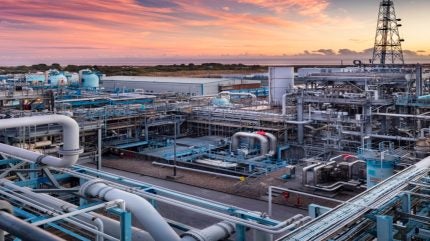
The UK is facing a critical situation as gas reserves dip to “concerningly low” levels amidst plummeting temperatures and a rise in demand from gas-fired power stations.
Energy services company Centrica has highlighted the stark contrast in gas inventory levels compared to last year, with current reserves at only 26% of capacity, which is around half full.

Discover B2B Marketing That Performs
Combine business intelligence and editorial excellence to reach engaged professionals across 36 leading media platforms.
This situation is similar across Europe, with gas storage being at 69% capacity on 7 January, a decrease from 84% at the same time in 2024.
The UK’s total gas storage capacity is notably less than that of France, Germany, or the Netherlands, with only 10% of their capacity.
Centrica operates the UK’s largest gas storage facility, Rough, which is currently 20% less stocked than at the same time last year, despite being full before winter.
The site has been instrumental this winter, supplying nearly 420 million cubic metres (mcm) of gas since early November 2024, enough to heat three million homes daily.

US Tariffs are shifting - will you react or anticipate?
Don’t let policy changes catch you off guard. Stay proactive with real-time data and expert analysis.
By GlobalDataRough closed in 2017, but it has been partially reopened, operating at the maximum safe capacity without further redevelopment.
Centrica has emphasised the importance of Rough, stating: “If Rough had been operating at full capacity in recent years, it would have saved UK households £100 ($124.088) from both their gas and their electricity bills each winter.”
The company is prepared to invest £2bn in upgrading Rough, potentially making it the world’s largest hydrogen storage facility. However, this requires the cap and floor model for long-duration energy storage to be extended to the site.
Large-scale hydrogen storage such as Centrica’s Rough site could reportedly reduce the UK’s energy costs by £1bn ($1.3bn) a year by 2050. Meanwhile, Europe’s rapid depletion of reserves and reliance on global LNG markets highlight the continent’s vulnerability to market volatility.
Centrica Group CEO Chris O’Shea said: “Energy storage is what keeps the lights on and homes warm when the sun doesn’t shine and the wind doesn’t blow, so investing in our storage capacity makes perfect economic sense. We need to think of storage as a very valuable insurance policy.”
The UK’s energy policy has recently been scrutinised, especially after comments by US President-elect Donald Trump criticising the windfall tax on oil and gas producers.
In contrast, the Labour Party has pledged to halt new North Sea oil and gas exploration licenses. The UK’s reliance on liquified natural gas (LNG) imports, primarily from the US, poses additional challenges due to the long travel distance and geopolitical tensions affecting trade routes.





